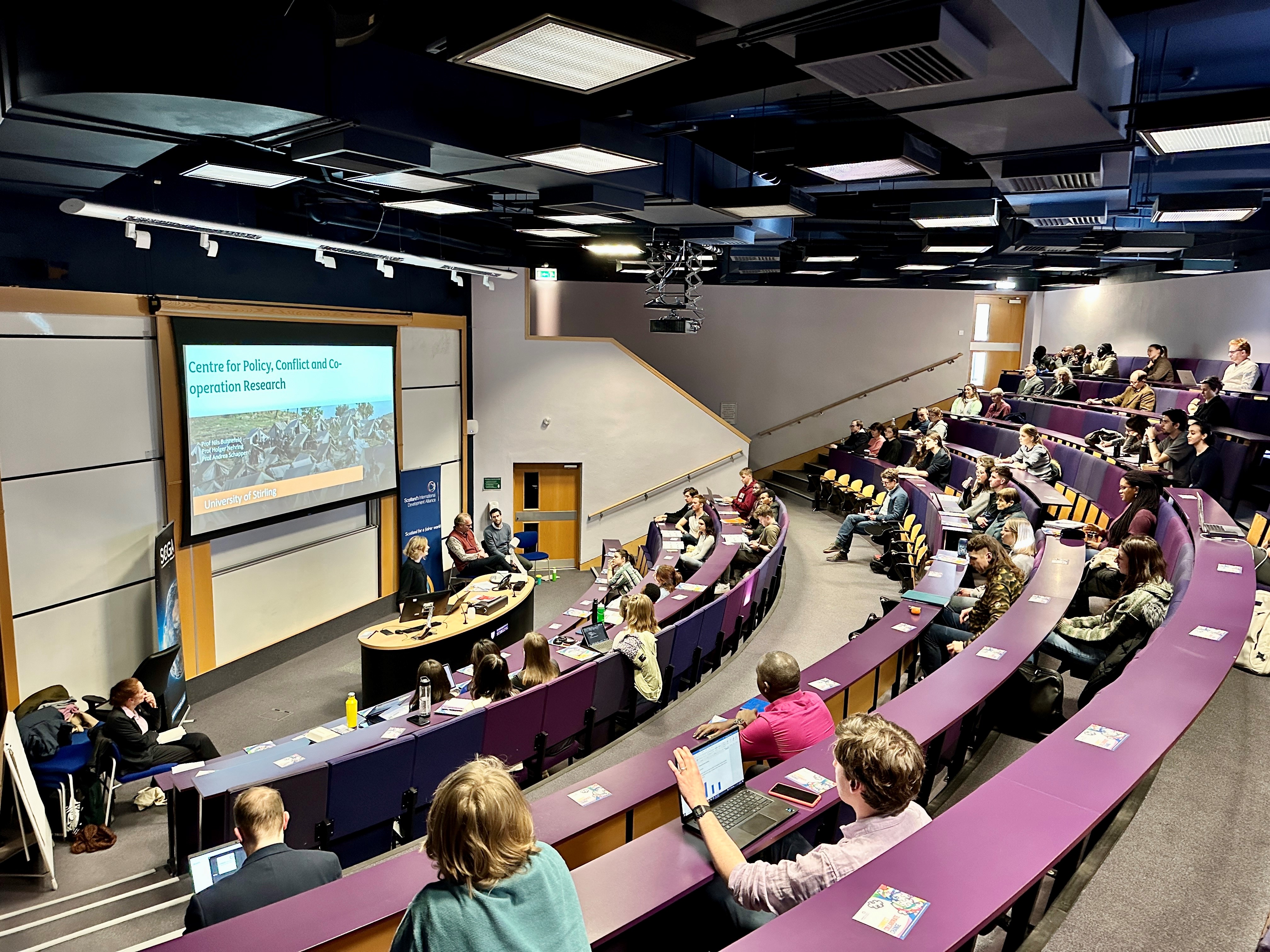Leveraging academic-NGO partnerships to support the SDGs
At the halfway point to 2030, how are organisations across Scotland progressing SDGs 13 and 15, and how can iNGOs and academia work more closely together to advance the broader SDG agenda? This was the focus of SIDA’s ‘Stepping up to the SDGs’ roadshow event at the University of Stirling.
SIDA Chief Executive Frances Guy opened the event by outlining how the world is making progress towards SDGs 13 and 15. The world is on the brink of a climate catastrophe and current actions and plans to address the crisis are insufficient. The world is facing a triple planetary crisis of climate change, pollution and biodiversity loss. The trend in forest loss, land degradation and the extinction of species is becoming worse, posing a severe threat to the health of the planet and people. Without a dramatic shift in our relationship with our natural environment and transformative action within this decade to reduce greenhouse gas emissions in all sectors, SDGs 13 and 15 will not be met.

Spotlight on the Centre for Policy, Conflict and Co-operation Research – an academic insight
Professor Nils Bunnefeld and Professor Adrea Schapper provided an introduction to the Centre for Policy, Conflict and Co-operation Research. Hosted by the University of Stirling, the Centre seeks to consider conflict and co-operation more broadly, in both international and domestic society and in relation to environmental and climate change. The Centre explores how conflict and co-operation work in practice, developing insights that will enable research to help in real-life situations.
Andrea and Nils shared examples of the Centre’s research projects, including the Collaborative Study on Hydroelectric Dams to highlight the conflicts that exist between different SDGs. While Hydroelectric Dams can be framed as a means of advancing SDG 13, damming water also leads to decreasing water quality and quantity. This can deplete delicate ecosystems and biodiversity exists, thereby hindering progress towards SDG 15. Nils outlined a framework for managing environmental conflicts, with the integration of science, policy and practice recognised as a positive driver for transformative change.
Achieving SDG 13 and 15 – Reflections on North-South Advocacy Partnerships
The audience heard from Julius Ng’oma, Civil Society Network on Climate Change (CISONECC), and Ben Wilson, Director of Partnerships at SCIAF, about their Loss and Damage project. On the front line of the climate crisis, extreme weather is ripping apart land, lives and livelihoods. As a result of human-induced climate change, droughts, floods and storms are becoming more extreme, and are happening more regularly than ever before. These impacts are driving extreme hunger, water insecurity, and the widespread displacement of people in the poorest parts of the world. As the world continues to warm, these problems are only set to get worse. For many years, with the support of their partners, SCIAF have campaigned on climate justice and encouraged governments and others around the world to act on Loss and Damage. At COP26, Scotland became the first government in the world to commit money to Loss and Damage, something SCIAF had campaigned for a long time. Thanks to the Scottish Government, and working with multiple partners including CISONECC, SCIAF delivered one of the first Loss and Damage programmes in the world, in Malawi. This helped more than 85,000 people rebuild their lives after successive cyclones hit the country. According to Ben and Julius, SCIAF also continue to raise up the voices of those affected by climate change through articles, academic papers, blogs, videos and documentaries.
Spotlight on CBM – an iNGO insight
Mark Barrell, Head of Advocacy at CBM, highlighted how they are supporting disability inclusive development and climate response. According to Mark, people with disabilities are two to four times more likely to die in a natural disaster than people without disabilities. Despite this, people with disabilities lack representation in climate action processes, policies, plans and programmes. Mark outlined how CBM are advocating for the meaningful engagement of disabled people and their representative organisations, championing a greater level of disability inclusion across climate change action. For example, CBM are providing disability inclusion advice and programme assistance to support the design and delivery of the Climate Just Communities project. Funded by the Scottish Government, this initiative aims to engage local communities in meaningful responses to climate-related issues and emergencies in Rwanda, Zambia and Malawi. By working in partnership with a range of partners, including SCIAF, CBM are seeking the full inclusion of people with disabilities in responses to climate change. According to Mark, what is good for people with disabilities is a universal gain for all.
Spotlight on the Challenges Group – Venturing towards the SDGs
The audience heard from Ross Isdale, Business Development Manager at the Challenges Group, about their Ventures Lab. The Ventures Lab provides an alternative path for aspiring or early-stage social entrepreneurs. It was designed to identify individuals or teams leading the development of innovations that can be a “game changer” in a specific sector or industry in one, but ideally multiple, locations globally. According to Ross, the Ventures Lab provides a fully integrated support runway for higher education social innovation from academic staff, Early Career Researchers (ECRs) and students. The Climate Change legal initiative (C2LI) is one social enterprise that was supported by the Ventures Lab. Founded by legal academics linked to the University of Strathclyde, C2LI is committed to growing legal knowledge and strengthening expertise in the law to drive just and transformational climate action. By translating academic work into policy oriented and practical output, C2LI continues to support the advancement of SDG 13 and 15.
Following an engaging discussion, Frances Guy wrapped up the session by underlining the need for collaborative efforts between academia and NGOs to drive progress towards SDGs 13 and 15.
